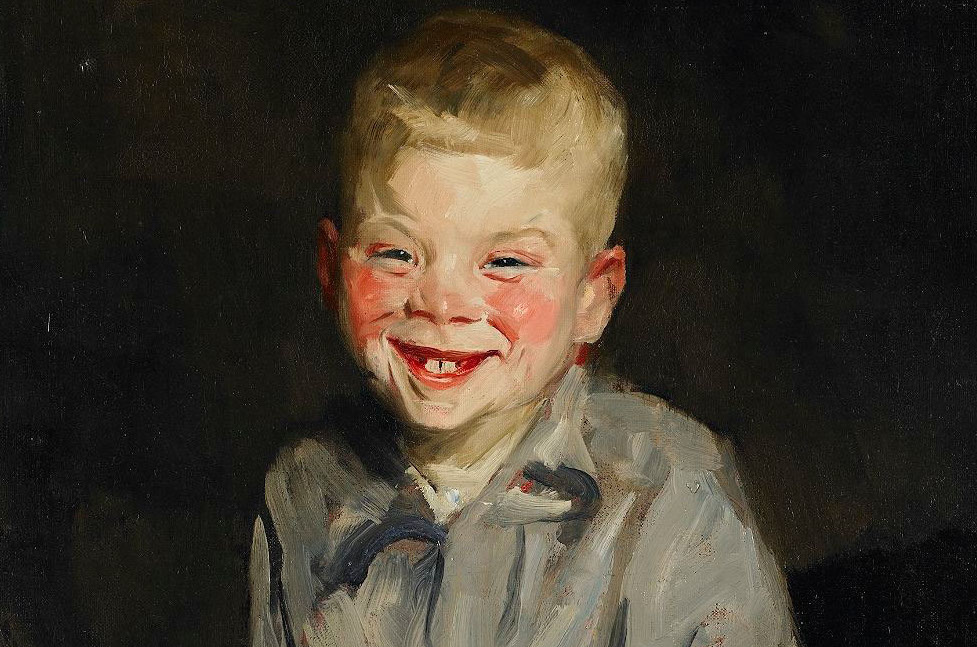【Tags】
LOL
Our Daily Correspondent

Robert Henri, The Laughing Boy, 1910.
Last night, I was part of a panel on the late novelist Dame Muriel Spark, in concert with the publication of The Informed Air, a collection of her essays. In no way am I an expert, but I ama devoted fan—more and more as I get older—and I was glad to take part in the celebration of a writer who should be more widely read.
As anyone on the East Coast knows, yesterday was characterized by lashing rains and driving winds—a fact that sort of explains why I was dressed like an old salt in a fisherman’s sweater, wellies, and slicker. (Emphasis on sort of. I put on some red lipstick to make it look as though the whole thing was dashing and deliberate, but I don’t think anyone was fooled—or cared.) In spite or maybe because of the monsoon-like conditions, it was a lot of fun, and I came away with a new appreciation for an author whose work is as notable for its guarded compassion as what John Updike termed its “sweet sting.”
Everyone agreed that Spark is frequently hilarious. At least, we thought so. In the course of the conversation, my friend Emily and I discovered that in recent months both of us had attempted to read particularly amusing passages aloud to respective boyfriends, and the men in question were completely unmoved. She wondered if it was a British-American thing; I wondered if it was a male-female thing. Whatever it was, it was awkward.
By chance, another friend returned my copy of Iris Owens’s After Claudethis week. It should be said that I consider After Claude’s first half to be one of the funniest things I’ve ever read. I literally laughed out loud on the subway, and I’m not prone to losing myself so thoroughly. My friend, however, told me that he “couldn’t get into it.” And in such situations, there’s no point in explaining whysomething is hilarious—and why someone is wrong.
Lord knows I’ve been on the other side of this. If I had a nickel for every time I’ve tried to get into The Ginger Man, I’d have a dime. The Dud Avocadoleft me stony-faced. We won’t even get started on Douglas Adams. But in no case did I blame these failures on the people who loved the books—I felt the fault lay with me. When we share what we find amusing, we make ourselves vulnerable. As a friend once said, watching someone guffaw at something you can’t get into “is kind of like watching them masturbate.”
Maybe I’m extra sensitive on the point. My parents used to have quite serious fights about which of the Marx Brothers was funniest—my dad felt that my mom’s preference for Groucho revealed a fundamental character flaw, and by implication, a cache of contemptible conventionality. One always felt that somewhere behind his words was the certainty that, had she been alive and in a position to, she just might have had a Bad War.
Getting back to Muriel Spark for a moment: we talked about why she was considered a “woman’s novelist,” and while that is certainly a phrase burdened by generations of condescension, in my book it’s no bad thing. When in 2008 the New York TimesArtsBeat blog asked editors of the Book Review to name the funniest novels of all time, the resulting list was overwhelmingly male. Said David Kelly, “Someone here mentioned Jane Austen, but only halfheartedly and only after I pointed out that not a single novel by a woman had been proposed. What gives?” I find this surprising mostly because the books I find funniest are all by women—and I don’t mean Jane Austen, droll as she can be. (I draw the line at rolling in the subway aisles over the antics of Lady Catherine de Bourgh, although, you know, go for it.) To my mind, it’s hard to beat Memento Morior The Ballad of Peckham Rye. Moments of Speedboatare as funny as anything I’ve read. Barbara Comyns can be weirdly hilarious, especially in Sisters by a River. And my love for Barbara Pym is on the record. For my money, you can’t top the “Dominion of the Birds” sequence in Excellent Women. But if I had to sum up what I love in one quote:
Father Anstruther shook his head, then took a plate and wandered off to choose his tea. “Fairies,” he muttered. “Who was it who used to make such deliciously light fairies?”
“It was Mother, Father,” replied Miss Dew, oddly.
Search
Categories
Latest Posts
7 Tech Predictions for 2018
2025-06-25 22:36The Founding Farmers by Robin Bellinger
2025-06-25 22:21An Interview with Lysley Tenorio
2025-06-25 21:49The Animal Mummies Wish to Thank the Following by Ramona Ausubel
2025-06-25 20:51Cradle to Grave
2025-06-25 20:26Popular Posts
Bankers’ Robberies
2025-06-25 22:19Part I: Race to ‘The Clock’ by Clancy Martin
2025-06-25 20:19Poodles, doodles, and memory-challenged gnomes
2025-06-25 20:01Featured Posts
The Most Disappointing PC Games of 2017
2025-06-25 22:23Relatos by Pierre Gonnord
2025-06-25 22:08Double Fault by A
2025-06-25 21:32Only One Day to Go! by The Paris Review
2025-06-25 20:49Camping Trip
2025-06-25 20:31Popular Articles
Putting Millions Back to Work
2025-06-25 22:23Happy Hour with Gian by Giancarlo DiTrapano
2025-06-25 21:49Staff Picks: Keith Haring’s Journals, ‘Library’ by The Paris Review
2025-06-25 21:12Wallace Stevens’s “Long and Sluggish Lines” by Eliza Griswold
2025-06-25 20:57Newsletter
Subscribe to our newsletter for the latest updates.
Comments (62971)
Unique Information Network
The Silent Treatment
2025-06-25 22:12Happy Information Network
First in Flight by Perrin Drumm
2025-06-25 22:00Information Information Network
First Impressions by Ricardo Sumalavia
2025-06-25 21:27Style Information Network
Thomas Sayers Ellis’s “Or,” by Robyn Creswell
2025-06-25 21:27Creation Information Network
Who’s Afraid of the Russian Soul?
2025-06-25 20:32